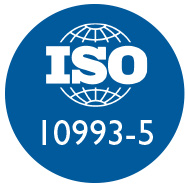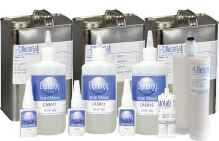
Medical devices undergo rigorous testing to determine their biocompatibility whenever they are expected to have contact with the human body. In order to improve medical device security, a series of standards were developed by the International Standards Organization called ISO 10993. The most common screening test for the biocompatibility of a medical device adhesive is the cytotoxicity test specified under ISO 10993-5. This is a relatively fast and inexpensive test where a sample of the cured adhesive in placed in vitro with animal tissue cells without exposing live animals to testing. After a specified length of time and conditions, the cells are examined for any toxic effects and have a high correlation with actual animal testing. If little or no bioreactivity is observed, the adhesive is deemed safe for medical device assembly.

ResinLab has submitted several products for ISO 10993-5 testing that have shown no cytotoxic effect and are therefore approved for medical device assembly. Test reports are available upon request. Other ResinLab adhesives have the potential for this approval but have not been tested to date. ResinLab is willing to invest in ISO 10993-5 testing for adhesives with the likelihood of approval and opportunities for use in medical device assembly applications.
| Product | Color | Viscosity (cps) | Specific Gravity | Shear Strength (psi) | Cure Speed (fixture/full cure) |
|---|---|---|---|---|---|
| EP750LV | Clear | 2,500 | 1.09 | 1,500 | 24 - 72h |
| UR6060 | Clear | 1,050 | 1.34 | 400 | - |
| UR7001 | Clear | 10,500 | 1.17 | 1,000 - 2,500 | - |
| UV7818M | Clear | 385 | 1.02 | 285 | 10 - 20s with UV light exposure |
| UV7853M | White | 130,000 | 2.61 | - | - |